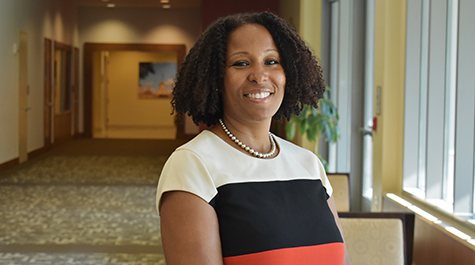Natoya Haskins named director of diversity and inclusion
Natoya Haskins, associate professor of counselor education, has been named the first director of diversity and inclusion for the School of Education.
“Equity and inclusion are at the heart of our work,” says Rob Knoeppel, dean of the School of Education. “It’s one of the highest priorities for our school as we move forward in addressing these issues in our community. Dr. Haskins brings a wealth of experience and passion for diversity, having examined diversity through myriad lenses in her research and leading impactful programs that advance equity here at William & Mary and far beyond. We are so grateful to have her in this role.”
A newly-created position, the director of diversity & inclusion serves as a member of the leadership team within the school, as well as on the university-wide Diversity & Inclusion Leadership Council. Specifically, the director is responsible for leading, envisioning, strategizing, and implementing processes, initiatives, and measurable actions leading toward greater diversity and inclusion throughout the school.
“I’m excited to take on this role and lead this work for the school,” says Haskins. “I applied because I wanted to help build a spirit of community and connection around equity, because no one person can do this work alone.”
She pointed to a favorite African proverb as an inspiration: If you want to go quickly, go alone. If you want to go far, go together. For Haskins, this is an opportunity to build a vision and a journey that the entire school community can undertake together.
A wealth of experience
Haskins began her career as a school counselor in a high-needs school where 99% of students were minority and 99% qualified for free and reduced lunch. Following her doctoral work, she focused her teaching, research and service on creating opportunities for underrepresented students and advancing social justice and equity within higher education and the counseling profession.
At William & Mary, she has built courses and expanded curriculum offerings related to multicultural competence, including building the social justice dashboard that is an integral component of the student experience in the online counseling degree.
Haskins’s research focuses on strategies to support underrepresented students and faculty, as well as culturally responsive theories and the role of school counselors as social justice activists.
She founded and co-directs the Social Justice & Diversity Research Fellows Program, which brings together researchers from across the university to support and promote research in the areas of social justice and diversity, and served as the co-director of WMSURE, a program that supports undergraduates from underrepresented backgrounds as they pursue research.
She has also been a leading voice and organizer of Courageous Conversations, a series of collaborative discussions within the School of Education regarding race and culture in schools and society. The events provide a safe space for faculty, staff and students to discuss issues of race, culture, diversity and inclusion both at William & Mary and in the schools, communities, agencies and organizations in which they serve and live.
A vision for the future
As Haskins looks to the future of DEI efforts at the School of Education, she aspires to balance short-term wins while working toward longer, lasting change.
“My leadership style focuses on transformation, and my many years of mentoring and coaching have trained me to consider each individual’s needs and be someone who motivates, inspires and encourages others,” says Haskins. “I aim to serve as a role model who engages in high standards of ethical behavior, but who isn’t afraid to challenge assumptions, take risks and explore new ideas.”
Among her priorities is the recruitment and retention of diverse faculty, staff and students; an improved climate and culture that centers a disposition toward social justice and equity; a review of programs to advance curriculum and instruction; and increased mentoring.
“We need to develop a shared language around DEI principles and constructs, so that we understand this work in the same way,” says Haskins. “And we need to connect resources to our values, so that we are truly reflecting and becoming the kind of community we want to be.”
